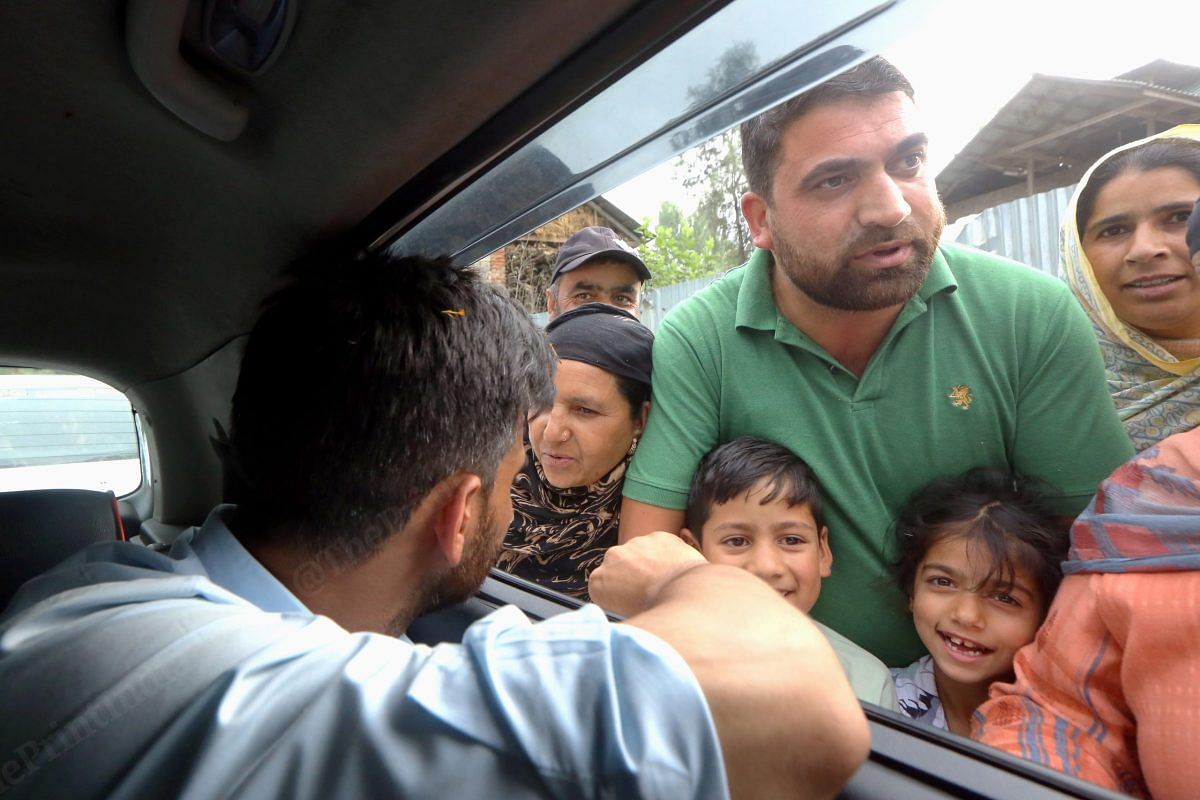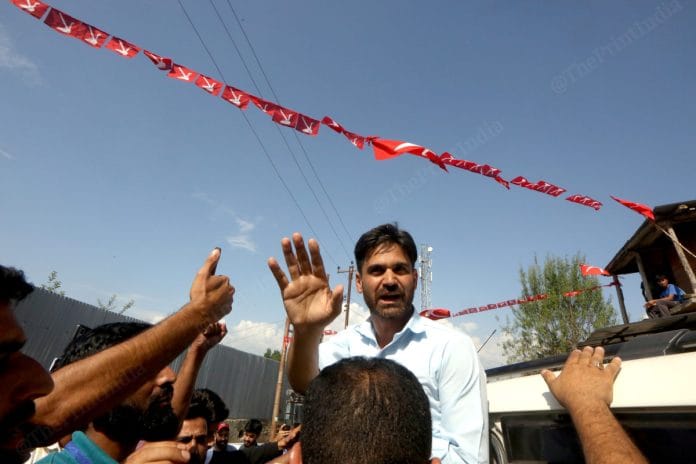Pulwama: There is ‘silent solidarity’ among Kashmiris today, and voting is becoming ‘an act of resistance and dissent’, senior Peoples Democratic Party leader Waheed Para says, highlighting how Kashmir has adjusted after the abrogation of Article 370.
In an interview with ThePrint, Waheed Ur Rehman Para, the PDP candidate from Pulwama, says a lot has changed in Kashmir in the past few years and that apart from the fear and the suffocation, there is an understanding now — the democratic process is paramount.
On Article 370, Waheed Para says a change in the government at the Centre can ensure the restoration of the special constitutional status of Jammu and Kashmir — it is a matter of political will. The PDP manifesto promises to pursue the matter.
Waheed Para is contesting the Pulwama seat, which goes to vote on 18 September in the first phase of the elections to the Jammu and Kashmir assembly. The last state election was nearly a decade ago.
Pulwama, one of the most keenly watched constituencies this election has had a history of violence. It was in Pulwama that a Central Reserve Police Force (CRPF) bus was attacked on 14 February 2019, killing 40 jawans on the Jammu-Srinagar national highway and altering the state’s political landscape.
“I think the image of Pulwama has to be dismantled a lot. It is not (just) misrepresented; it looks un-represented in many ways…. Pulwama is also a place with so much stigma and trauma attached to it. OGWs (overground workers who help terrorists), militant terrorists — every stereotype has been attached to Pulwama — as if we produce just that,” Waheed Para said, speaking to ThePrint.
“Pulwama is one of the producers of the best ‘zafran’, rice, and milk, but nobody knows that image. So, we are trying to rebuild and reimagine the image and also give hope to the young people who feel hopeless, who feel we have been stigmatised as OGWs,” he said.
‘Detention under UAPA a traumatic experience’

Waheed Ur Rehman Para calls the revocation of Article 370 on 5 August 2019 a provocation by the Bharatiya Janata Party government to make people hit the streets. He also criticises the Congress for failing to protect Article 370, alleging the party poked holes in it when in power.
On the crackdown that followed the Article 370 revocation, the PDP leader says, “When Kashmir was under crackdown, we realised that if we had not preserved ourselves, a lot of our young people would have lost lives. So we have understood the importance of how to deal with this aggression, which was a state-sponsored aggression on 5 August.”
Circling back to the importance of the electoral process, he adds, “Kashmiris also realise that this (voting) is the way we are being heard more…. And that if you love Kashmir, you have to live for it, not die for it. And that dissent is democratised in many ways. And that democracy is becoming an act of resistance. Voting is becoming an act of resistance.”
On the possibility of Article 370’s restoration, Waheed Para says that politically, it is realistic.
“The BJP for 70 years has been raising this issue, and it (Article 370) was part of the Constitution. We are not seeking anything anti-India, anti-constitutional, or anything anti-democratic,” the PDP leader says. “Article 370 is still there. So, I think we need to understand whatever happened on 5 August can be reversed by the same Parliament, by the same people of India, by the same numbers tomorrow. If tomorrow you have a different government, you have a different number.”
“You never know how things evolve in politics, even though there is a Supreme Court ruling in the matter now. But earlier, there were Supreme Court rulings, which said it (Article 370) is permanent. So, I think it is a political issue, and it is an issue of sentiments in Jammu and Kashmir — the way it was done,” Waheed Para says. “People are unhappy with the method, and there was no consent of the people. So, this continues to dominate the political narrative, especially the assembly elections.”
“One of our generations has been lost to drugs, another in depression, another in jails, and another in graves. So, we do not want to lose young people. I think there is a huge silent solidarity among each other, support for each other,” Waheed Para, a youth face in the PDP, says while campaigning, youngsters queuing up behind him for a photo.
Recounting his days in Central Jail, Srinagar, Waheed Para says when the government talks about peace and dignity and yet, in the criminal justice system, there is no way for young people to get bail once charged with the UAPA, “the process consumes you, and the process becomes a punishment”.
“I think this (UAPA) is the story of most Kashmiris, especially the young people today. Thousands of young people are detained in jails, and this remains one of the pressing issues on the ground. They are undergoing a very traumatic experience, and I have personally been a witness,” Waheed Para says. “The demand is their release. It is part of the PDP manifesto, and it has been part of our political process that young people, first-time offenders, should be released. There should be amnesty for them.”
Para says the elections nowadays are like the post-1987 polls — despite glaring issues, young people, women, and elders join the democratic process in huge numbers. “I think it puts a lot of responsibility on us, more than just winning elections,” he adds.
Also Read: Modi wasn’t just out to ‘win hearts’ in J&K. It was also a signal to the world
‘Expect fractured mandate’
The PDP has dominated the Pulwama seat since 2022, and the National Conference (NC) is now attempting to wrest it away.
Mohammad Khalil Bandh won the seat on a PDP ticket three consecutive times — 2002, 2008, and 2014 — and served as the PDP Pulwama district president before quitting and joining the NC. The NC has named him the Pulwama candidate in this election.
Earlier this year, Waheed Para lost the Lok Sabha elections from Srinagar against Aga Ruhullah of the National Conference (NC).
Speculating on the government formation in Jammu and Kashmir, Waheed Para says the PDP will play a key role. Kashmir will give a “diverse” mandate, he says, adding that it will not be a one-sided contest for any party, including the NC.
“There are differences between the different regions and also different issues. This is a constituency election. So, a lot matters. There is no wave for a particular party in Kashmir. So, this is definitely going to be a very diverse mandate in many ways,” he tells ThePrint.
On Jamaat-e-Islami and Independent candidates such as ‘Engineer’ Rashid making an entry into politics, Waheed Para says the PDP is not against any candidate. “I think Mehbooba ji was the first leader to talk about releasing political prisoners. She is the first leader who lost her government because of dialogues with Jamaat separatists… and there was a full crackdown on her party because she has been consistently following and pushing the issue — the dialogue with stakeholders, and the release of political prisoners and Jamaat-e-Islami leaders.”
Waheed Para also wants the ban on Jamaat-e-Islami revoked so that it can fight polls under its name and people are aware of who the Jamaat candidate is, which, he says, is unclear right now.
On the other hand, Waheed Para calls the PDP-BJP alliance in 2015 an act of “conflict resolution”.
“The PDP-BJP alliance came not for mere government formation. It was an act of conflict resolution. Mufti sahab’s (PDP founder Mufti Mohammad Sayeed’s) entire objective and aim of forming the PDP was for a process-driven party to involve separatist and mainstream (leaders) — involve the stakeholders who are away from the democratic process,” he says.
“So, the 2014 alliance was seen as an opportunity to create some space for, you know, conflict resolution. It was not about power sharing, chief ministership, cabinet, and such issues, but it did not work because there are so many stakeholders, and it is a complex problem,” he adds.
Waheed Para says the larger objective was to use the link to the prime minister to engage at higher levels to resolve conflicts.
“You had an all-party delegation because of Mehbooba ji’s continuous persuasions to New Delhi. The all-party delegation reached the doors of Hurriyat; they reached (Syed Ali Shah) Geelani’s home. You had an interlocutor appointed for talks with separatists. You had a ceasefire with militants. The point that I am trying to make is that the larger objective of the alliance was to address the pain of Kashmir,” he adds.
Post-results, which, Waheed Para says, would throw a fractured mandate, the PDP plans to align with INDIA. “I think the PDP has clearly said they want to be part of the INDIA Alliance. We do not have a meeting ground with the BJP.”
The PDP leader says though Jammu and Kashmir may have a “weak” government, there is a Supreme Court direction for restoring statehood. “We can move to the Supreme Court. We can build pressure. We can pass a resolution for the restoration of the state with the special status,” he adds.
(Edited by Madhurita Goswami)






